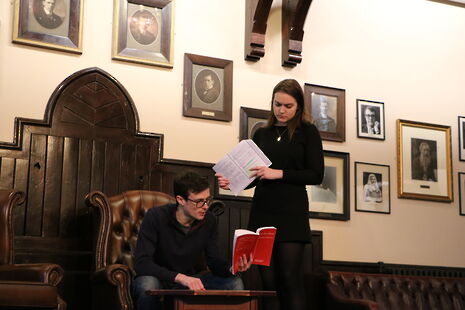Yes, Prime Minister review: ‘entertainment with a kick’
While the production felt too long at times, our reviewer nonetheless appreciated the excellent comic performances and effective use of the Cambridge Union Debating Chamber

Yes, Minister, and subsequently Yes, Prime Minister, is perhaps one of Britain’s most well-loved satires and this take of the 2012 theatrical version did not disappoint. The clever script was matched by some excellent comic performances that follow the premiership of Jim Hacker under the (occasionally overly strong-handed) guidance of senior civil servants Sir Humphrey Appleby and Bernard Woolley, who have been joined by an assortment characters not recognised from the TV show.
The satire was, of course, set in a time of crisis, not only in the UK but across the globe and the Prime Minister must deal with a conference in stalemate, a spiralling debt crisis, high unemployment, not to mention the usual Westminster manipulation and charming incompetency we know and love from the original sitcom. The script teetered on the edge of what was palatable, even for satire, which made for some collective gasps and, at one moment, an almost audible wince from every member of the audience.
Director and cast must be praised for playing up the most uncomfortable moments, to remind us that this is indeed mockery which kept the play just on the right side of the line. Eduardo Strike gave us a well-observed Jim Hacker, flitting between the arrogant politician and a quivering wreck admirably as his political career took some dramatic and farcical ups and downs, and Hannah Lyall’s Bernard was well-observed and wonderfully bemused. Her expression in particular had the capability to make a scene. Tom Nunan’s Humphrey shone in his pomposity and stuffiness, his one-liners virtually always hit their mark with Nunan demonstrating an excellent comic timing that made the entire performance.
There was something rather fitting about the use of the Union, given its history and legacy, making the bumbling machinations of an incompetent Prime Minister’s office ever more amusing. Director Mollie Semple must be credited for her use of the Union’s requirement of traverse staging and for taking advantage of the facilities on offer; the cameras were used to great effect, even if it was only for one gag. The cast must also be credited for dealing admirably with the traverse set-up although there was the occasional need for some louder projection to adapt to the acoustics. Nevertheless, it was a novel venue that added to the production – the Union fit the play’s setting at the country residence of the Prime Minister, Chequers, rather well – and I hope to see the Union open its doors more often and make theatre there a more regular occurrence.
My one main complaint was that it was too long and sadly the final line (I won’t give it away if you don’t know the show!) did not feel as well earnest as it could have. Although this was mainly the responsibility of the script – there were parts that felt overwritten and as such dragged – which it must be acknowledged student theatre can do very little about, I cannot help but feel that with some picked up cues, greater attention to the shape and escalation of the second half in particular, this could be somewhat remedied.
Nevertheless, Yes, Prime Minister was an entertaining and unusual night at the theatre and, if you are looking for some end of term pick-me-up entertainment with a kick, I strongly recommend it.
Yes, Prime Minister was on at the The Cambridge Union Debating Chamber 12-13 March
 News / Cambridge welcomes UK rejoining the Erasmus scheme20 December 2025
News / Cambridge welcomes UK rejoining the Erasmus scheme20 December 2025 News / CUP announces funding scheme for under-represented academics19 December 2025
News / CUP announces funding scheme for under-represented academics19 December 2025 News / News in Brief: humanoid chatbots, holiday specials, and harmonious scholarships21 December 2025
News / News in Brief: humanoid chatbots, holiday specials, and harmonious scholarships21 December 2025 News / SU reluctantly registers controversial women’s soc18 December 2025
News / SU reluctantly registers controversial women’s soc18 December 2025 Lifestyle / All I want for Christmas is a new hanukkiah22 December 2025
Lifestyle / All I want for Christmas is a new hanukkiah22 December 2025









